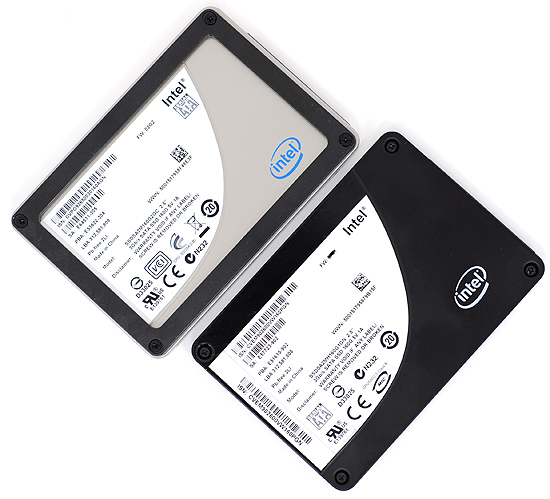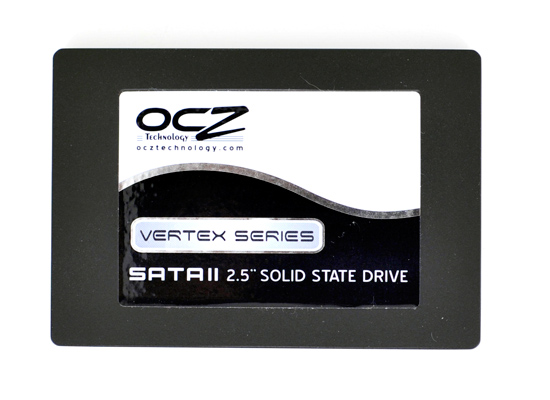The SSD Relapse: Understanding and Choosing the Best SSD
by Anand Lal Shimpi on August 30, 2009 12:00 AM EST- Posted in
- Storage
One Tough Act to Follow
What have I gotten myself into? The SSD Anthology I wrote back in March was read over 2 million times. Microsoft linked it, Wikipedia linked it, my esteemed colleagues in the press linked it, Linus freakin Torvalds linked it.
The Anthology took me six months to piece together; I wrote and re-wrote parts of that article more times than I'd care to admit. And today I'm charged with the task of producing its successor. I can't do it.
The article that started all of this was the Intel X25-M review. Intel gave me gold with that drive; the article wrote itself, the X25-M was awesome, everything else in the market was crap.

Intel's X25-M SSDs: The drives that started a revolution
The Anthology all began with a spark: the SSD performance degradation issue. It took a while to put together, but the concept and the article were handed to me on a silver platter: just use an SSD for a while and you’ll spot the issue. I just had to do the testing and writing.

OCZ's Vertex: The first Indilinx drive I reviewed, the drive that gave us hope there might be another.
But today, as I write this, the words just aren't coming to me. The material is all there, but it just seems so mature and at the same time, so clouded and so done. We've found the undiscovered country, we've left no stone unturned, everyone knows how these things work - now SSD reviews join the rest as a bunch of graphs and analysis, hopefully with witty commentary in between.
It's a daunting, no, deflating task to write what I view as the third part in this trilogy of articles. JMicron is all but gone from the market for now, Indilinx came and improved (a lot) and TRIM is nearly upon us. Plus, we all know how trilogies turn out. Here's hoping that this one doesn't have Ewoks in it.
What Goes Around, Comes Around
No we're not going back to the stuttering crap that shipped for months before Intel released their X25-M last year, but we are going back in the way we have to look at SSD performance.
In my X25-M review the focus was on why the mainstream drives at the time stuttered and why the X25-M didn't. Performance degradation over time didn't matter because all of the SSDs on the market were slow out of the box; and as I later showed, the pre-Intel MLC SSDs didn’t perform worse over time, they sucked all of the time.
Samsung and Indilinx emerged with high performance, non-stuttering alternatives, and then we once again had to thin the herd. Simply not stuttering wasn't enough, a good SSD had to maintain a reasonable amount of performance over the life of the drive.
The falling performance was actually a side effect of the way NAND flash works. You write in pages (4KB) but you can only erase in blocks (128 pages or 512KB); thus SSDs don't erase data when you delete it, only when they run out of space to write internally. When that time comes, you run into a nasty situation called the read-modify-write. Here, even to just write 4KB, the controller must read an entire block (512KB), update the single page, and write the entire block back out. Instead of writing 4KB, the controller has to actually write 512KB - a much slower operation.
I simulated this worst case scenario performance by writing to every single page on the SSDs I tested before running any tests. The performance degradation ranged from negligible to significant:
| PCMark Vantage HDD Score | New | "Used" |
| Corsair P256 (Samsung MLC) | 26607 | 18786 |
| OCZ Vertex Turbo (Indilinx MLC) | 26157 | 25035 |
So that's how I approached today's article. Filling the latest generations of Indilinx, Intel and Samsung drives before testing them. But, my friends, things have changed.
The table below shows the performance of the same drives showcased above, but after running the TRIM instruction (or a close equivalent) against their contents:
| PCMark Vantage HDD Score | New | "Used" | After TRIM/Idle GC | % of New Perf |
| Corsair P256 (Samsung MLC) | 26607 | 18786 | 24317 | 91% |
| OCZ Vertex Turbo (Indilinx MLC) | 26157 | 25035 | 26038 | 99.5% |
Oh boy. I need a new way to test.










295 Comments
View All Comments
GourdFreeMan - Tuesday, September 1, 2009 - link
Yes, rewriting a cell will refill the floating gate with trapped electrons to the proper voltage level unless the gate has begun to wear out, so backing up your data, secure erasing your drive and copying the data back will preserve the life (within reason) of even drives that use minimalistic wear leveling to safeguard data. Charge retention is only a problem for users if they intend to use the drive for archival storage, or operate the drive at highly elevated temperatures.It is a bigger problem for flash engineers, however, and one of the reasons why MLC cannot be moved easily to more bits per cell without design changes. To store n-bits in a single cell you need 2^n separate energy levels to represent them, and thus each bit is only has approximately 1/(2^(n-1)) the amount of energy difference between states when compared to SLC using similar designs and materials.
Zheos - Tuesday, September 1, 2009 - link
Man you seem to know a lot about what you're talking about :)Yeah now i understand why SSD for database and file storage server would be quite a bad idea.
But for personal windows & everyday application storage, seems like a pure win to me if you can afford one :)
I was only worried about its life-span but thankx to you and you're quick replys (and for the maths and technical stuff about how it realy work ;) im sold on the fact that i will buy one soon.
The G2 from Intel seems like the best choice for now but I'll just wait and see how it's going when TRIM will become almost enable on every SSD and i'll make my decision there in a couple of months =)
GourdFreeMan - Wednesday, September 2, 2009 - link
It isn't so much that SSDs make a bad storage server, but rather that you can't neglect to make periodic backups, as with any type of storage, if your data has great monetary or sentimental value. In addition to backups, RAID (1-6) is also an option if cost is no object and you want to use SSDs for long term storage in a running server. Database servers are a little more complicated, but SSDs can be an intelligent choice there as well if your usage patterns aren't continuous heavy small (i.e. <= 4K) writes.I plan on getting a G2 myself for my laptop after Intel updates the firmware to support TRIM and Anand reviews the effects in Windows 7, and I have already been using an Indilinx-based SLC drive in my home server.
If you do anything that stresses your hard drive(s), or just like snappy boot times and application load times you will probably be impressed by the speeds of a new SSD. The cost per GB and lack of long term reliability studies are really the only things holding them back from taking the storage market by storm now.
ninevoltz - Thursday, September 17, 2009 - link
GourdFreeMan could you please continue your explanation? I would like to learn more. You have really dived deeply into the physical properties of these drives.GourdFreeMan - Tuesday, September 1, 2009 - link
Minor correction to the second paragraph in my post above -- "each bit is only has" should read "each representation only has" in the last sentence.philosofool - Monday, August 31, 2009 - link
Nice job. This has been a great series.I'm getting a SSD once I can get one at $1/GB. I want a system/program files drive of at least 80GB and then a conventional HDD (a tenth of the cost/GB) for user data.
Would keeping user data on a conventional HDD affect these results? It would seem like it wouldn't, but I would like to see the evidence.
I would really like to see more benchmarks for these drives that aren't synthetic. Have you tried things like Crysis or The Witcher load times? (Both seemed to me to have pretty slow loads for maps.) I don't know if these would be affected, but as real world applications, I think it makes sense to try them out.
Anand Lal Shimpi - Monday, August 31, 2009 - link
Personally I keep docs on my SSD but I keep pictures/music on a hard drive. Neither gets touched all that often in the grand scheme of things, but one is a lot smaller :)In The SSD Anthology I looked at Crysis load times. Performance didn't really improve when going to an SSD.
Take care,
Anand
Eeqmcsq - Monday, August 31, 2009 - link
I would have thought that the read speed of an SSD would have helped cut down some of the compile time. Is there any tool that lets you analyze disk usage vs cpu usage during the compile time, to see what percentage of the compile was spent reading/writing to disk vs CPU processing?Is there any way you can add a temperature test between an HDD and an SSD? I read a couple of Newegg reviews that say their SSDs got HOT after use, though I think that may have just been 1 particular brand that I don't remember. Also, there was at least one article online that tested an SSD vs an HDD and the SSD ran a little warmer than the HDD.
Also, garbage collection does have one advantage: It's OS independent. I'm still using Ubuntu 8.04 at work, and I'm stuck on 8.04 because my development environment WORKS, and I won't risk upgrading and destabilizing it. A garbage collecting SSD would certainly be helpful for my system... though your compiling tests are now swaying me against an SSD upgrade. Doh!
And just for fun, have you thought about running some of your benchmarks on a RAM drive? I'd like to see how far SSDs and SATA have to go before matching the speed of RAM.
Finally, any word from JMicron and their supposed update to the much "loved" JMF602 controller? I'd like to see some non-stuttering cheapo SSDs enter the market and really bring the $$$/GB down, like the Kingston V-series. Also, I'd like to see a refresh in the PATA SSD market.
"Am I relieved to be done with this article? You betcha." And I give you a great THANK YOU!!! for spending the time working on it. As usual, it was a great read.
Per Hansson - Monday, August 31, 2009 - link
Photofast have released Indilinx based PATA drives;http://www.photofastuk.com/engine/shop/category/G-...">http://www.photofastuk.com/engine/shop/category/G-...
aggressor - Monday, August 31, 2009 - link
What ever happened to the price drops that OCZ announced when the Intel G2 drives came out? I want 128GB for $280!